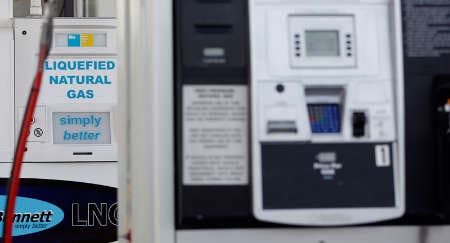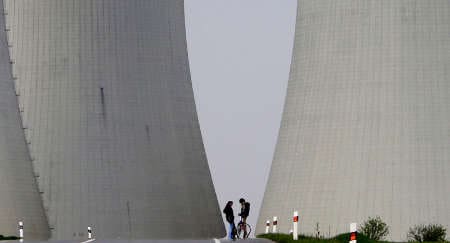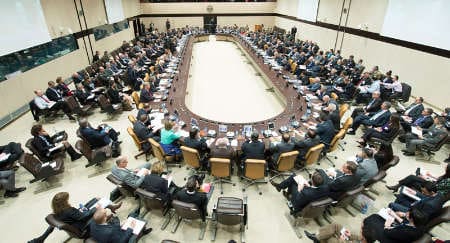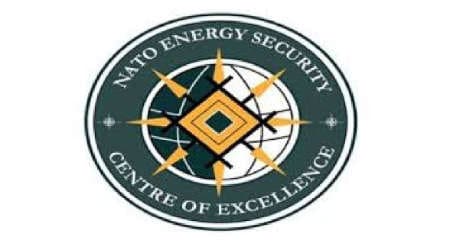NATO’s energy security agenda
We must make energy diversification a strategic transatlantic priority and reduce Europe’s dependency on Russian energy.
When NATO Secretary General Anders Fogh Rasmussen made this statement in March 2014, in the context of the Ukraine crisis, he expressed what few NATO officials had ever said in public: energy security is becoming a truly strategic issue, with numerous implications for Allied security.
Indeed, even without the new concerns raised by the Ukrainian crisis, the political, economic and security challenges surrounding the energy supply of many NATO Allies are profound: Europe’s dependency on oil and gas imports is increasing, as are the energy needs of rising powers such as China and India; political instability haunts many energy-producing and transit states; the quest for energy and other resources has sparked territorial disputes in several parts of the world; terrorist and cyber attacks against refineries, pipelines and power plants are a common occurrence in many countries, as is piracy along critical maritime choke points. Finally, there is also the energy challenge of military operations: with military forces deployed far from home, the logistical and financial burden is constantly increasing, necessitating new energy efficiency measures.
Is NATO ready? A few years ago, an answer to this question would have come only hesitantly. It was only at the 2008 Bucharest Summit when NATO was given a dedicated mandate to work in the field of energy security. Initially, Allies struggled to define NATO’s role in an area which is largely non-military in nature, features many institutional players, and, above all, remains mostly a national responsibility. Over the past years, however, NATO’s energy security agenda has become ever more systematic and coherent, focusing on three major areas: raising strategic awareness of energy developments with security implications, contributing to the protection of critical energy infrastructure, and enhancing energy efficiency in the military.
Energy Security as Part of NATO Strategic Awareness
While NATO is not an energy institution, energy developments affect the international security environment and, hence, touch on Allies’ security interests. For example, the American shale gas “revolution” and growing volumes of Liquefied Natural Gas (LNG) shipped worldwide may raise new maritime security concerns. By the same token, falling oil and gas prices could increase instability in many non-NATO energy suppliers that are highly dependent on energy exports, including Russia. Finally, energy factors are playing a major role in the current crisis in Ukraine, as supply disruptions, would have far reaching security implications for some NATO Allies.
For all these reasons, strategic awareness of global and regional energy developments is part and parcel of NATO’s energy security agenda. NATO’s political consultation process, supported by shared intelligence, provides Allies with a confidential setting in which to discuss energy developments that affect their security in the broadest sense. An important milestone in this regard was the North Atlantic Council’s seminar on global energy developments, which took place in January 2014. Supported by outside experts, this informal gathering sparked a lively discussion on the security implications of a changing energy landscape. Since NATO is not an energy institution, it often relies on expertise provided by other international organizations, such as the International Energy Agency, as well as think tanks and academia.
NATO’s own existing in-house analytical capabilities allow for deeper analyses of how energy, economic, environmental and other factors may impact on NATO’s policies and operations. Enhancing awareness also includes partner countries. For example, individual partners can meet with NATO's 28 Allies in the so-called “28+n” meetings, which provide Allies with detailed insights about these partners’ energy policies and security perceptions.
The growing importance of energy considerations in the international debate suggests that energy security could become a permanent fixture in NATO’s education and training programmes. Diplomats and military leaders alike would be given the opportunity to develop a better understanding of energy and related issues, such as resource competition and climate change, as drivers of future security developments. To this end, courses at NATO’s training facilities as well as at national institutions are currently being developed, with the first Strategic Awareness Course to take place at the NATO School in Oberammergau in late October 2014.
Critical Energy Infrastructure Protection: NATO’s Contribution
Energy infrastructure is a critical part of global energy security, and is subject to a number of vulnerabilities. Around half of the total world oil production is transported by oil tankers on fixed maritime routes, many of which have to pass critical choke points. Port facilities are more complex and congested than ever before. And many parts of critical energy infrastructure today are heavily reliant on cyber systems, which make them vulnerable to cyber attacks.
Moreover, over the past years, terrorists and insurgents conducted on average about 500 attacks each year against energy-related targets. This included the bombing of gas and oil pipelines; attacks on fuel trucks; killing and kidnapping associated personnel, and disrupting of electrical power systems. Most of these attacks are clustered in a few specific regions, such as West Africa. However, attacks on energy infrastructure can reverberate far beyond their point of origin. As energy markets are volatile even a single attack can lead to global price spikes. Terrorism can drive up insurance premiums. And the interruption of the flow of energy – even if only briefly – can have multiple ripple effects, both economically and psychologically. In short, energy infrastructure will remain a tempting target.
As most NATO member states depend on energy imports from regions outside the Alliance, they have a vested interest in the security of energy infrastructure in the producing or transit countries. Accordingly, sharing best practices on the protection of critical energy infrastructure remains NATO’s most frequently offered cooperation item with partner countries with respect to energy security. Activities in this regard benefit from NATO’s longstanding expertise in crisis and consequence management as well as civil emergency planning, and from the effective involvement of the private sector. NATO also enhances its competence to provide support to the protection of energy infrastructure through its counter-piracy operations in the Indian Ocean.
Among NATO’s strongest contributions in this field, however, is its capability to ensure the freedom of navigation in the maritime domain. As an increasing share of global oil and LNG shipments is transported by sea, the security of maritime lines of communication, will become ever more important. Equally importantly, by incorporating energy-related scenarios in relevant exercises, NATO ensures that its political-military interface and procedures are up to par with the requirements of complex crisis management. The fact that some of these exercises involve both partner countries and other international organisations, testifies to the interconnected nature of these challenges as well as to NATO’s readiness to play in a team. Since building competence on critical energy infrastructure protection is an objective of Allies and partner countries alike, partners can augment NATO’s training efforts in this area by offering some of their own.
Improving Energy Efficiency of Our Forces
Even before the attacks on NATO fuel convoys in Afghanistan and Pakistan it had been widely acknowledged that the growing fuel requirements of allied forces can compromise their operational effectiveness. Since some of NATO's future missions will involve long distances and a sustained presence, they require ever larger support structures, which also increase the risk for the soldiers. Several NATO member nations have thus started to examine ways to reduce their dependence on traditional fuels and shrink their logistics and environmental footprint. However, these are essentially national initiatives. NATO has started to bring scattered national efforts together, with a view to share knowledge on promising technologies (e.g. smart grids in deployable base camps, fuel cells), agree common standards to enhance allied interoperability, and showcase the best examples of energy efficient equipment.
To this end, NATO adopted a “Green Defence” framework and stood up a group of experts – the Smart Energy Team (SENT) – that works closely with other NATO stakeholders, such as military engineers and fuel experts.
Reducing fuel costs, minimising the risk for soldiers, and demonstrating environmental awareness is in the interest of both Allies and partners alike. For this reason, some partner countries are part of the SENT project. NATO’s Science for Peace and Security (SPS) programme also contributes to energy security: in addition to supporting SENT, it serves as a platform for cooperation with universities and research institutes, where most innovative technologies are conceived.
To ensure that energy efficiency in the military is fully understood and applied throughout NATO’s militaries, it needs to be adequately reflected in NATO’s training and education efforts. The NATO Energy Security Centre of Excellence in Lithuania has taken on a lead role in this regard. The Centre will also examine the behavioral change that is required to firmly ingrain the need to save and conserve energy in the way NATO plans and conducts its future missions.
Conclusion
NATO’s role in energy security will remain modest, yet it is an essential part of the Alliance’s modern toolkit. Energy issues have simply become too intertwined with other security developments to allow NATO to ignore them. In the globalized world of the 21st century, the Atlantic Alliance cannot afford a blind spot.






